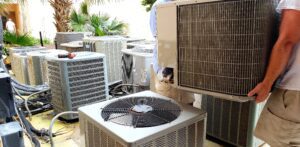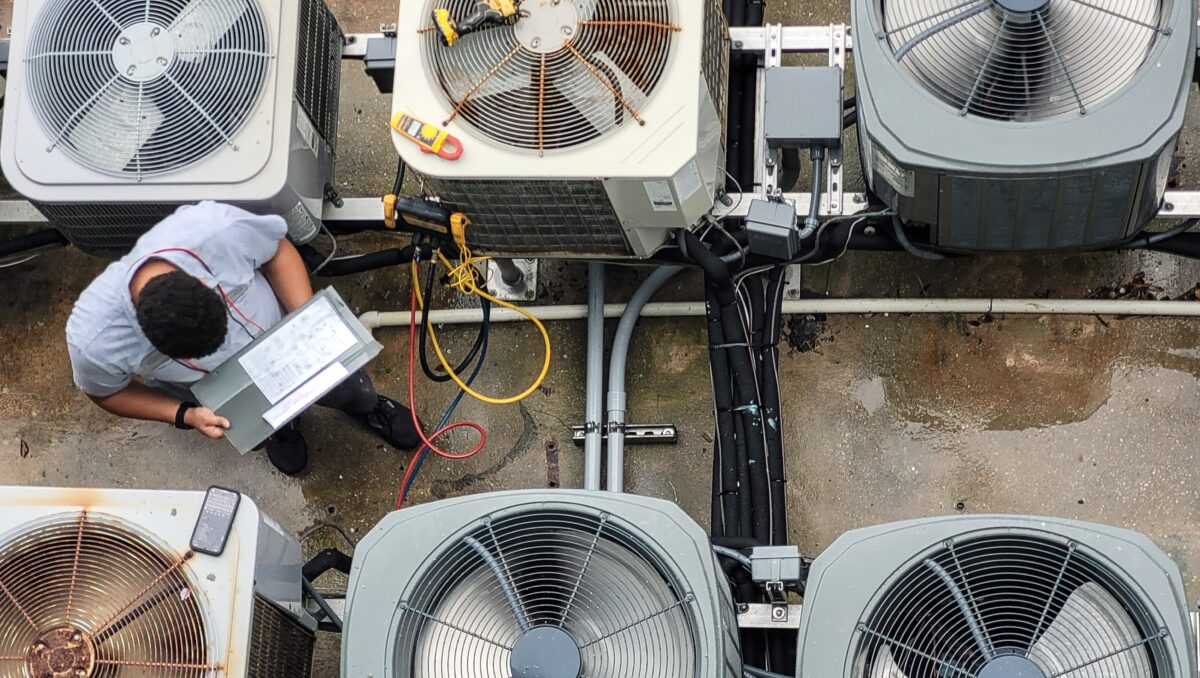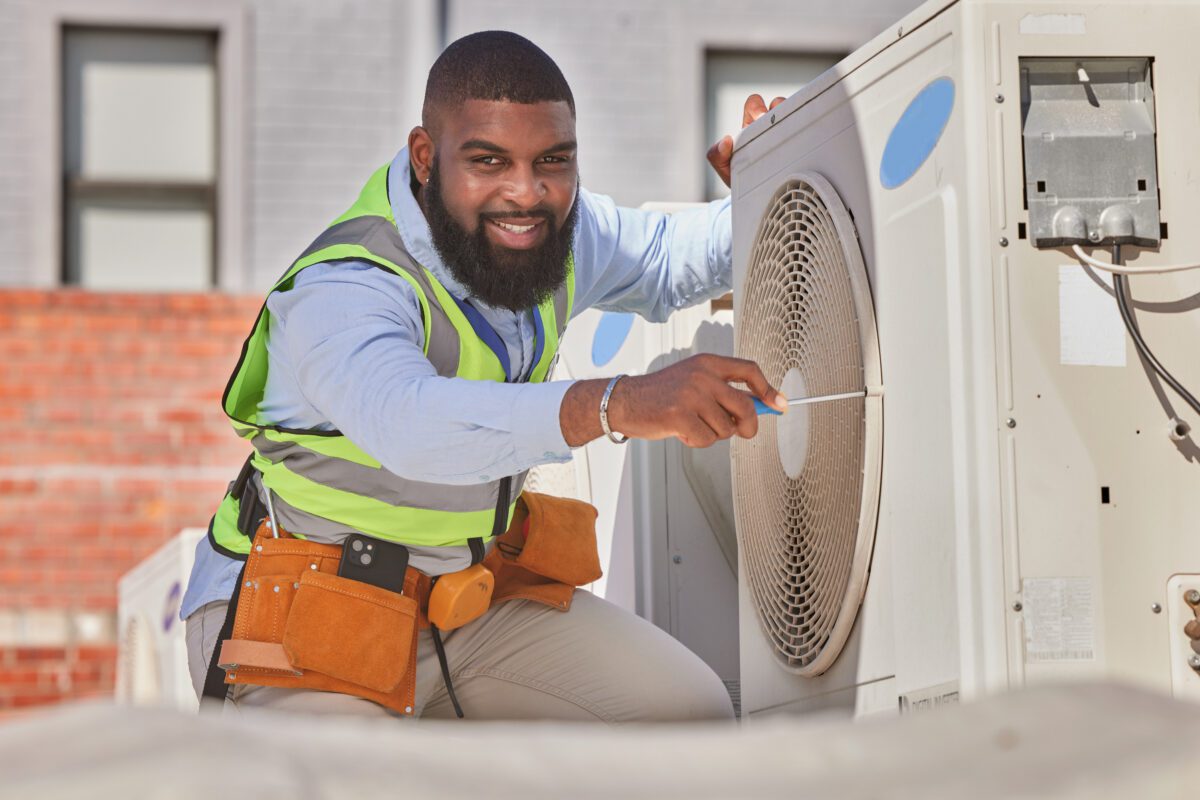When To Repair Your HVAC System And When To Replace It
Choosing Between Repairing & Replacing Your HVAC System
If you run or manage a commercial building, you’ll know that maintaining an optimal indoor environment is crucial for both productivity and efficiency. And central to ensuring that the building runs smoothly is your HVAC system. It operates as the backbone of your building’s climate control, ensuring a comfortable atmosphere for employees and clients. And, as a complex mechanical system, it’s subject to wear and tear. If you’re in a situation where your HVAC system is getting a little rickety or is underperforming and generating costly ad hoc repairs, the question arises: should you repair or replace your HVAC system?
A repair might resolve short-term problems and might appear to be the most cost-effective option, but it could be a band-aid on a larger, more systemic issue. Conversely, replacing an HVAC system represents a significant investment. Yet, it could lead to improved energy efficiency, lower maintenance costs, and more reliable climate control in the long term.
Whether you oversee a small commercial space or a large corporate facility, understanding the dynamics of repairing versus replacing your HVAC system is vital.
How HVAC systems work
A commercial HVAC system consists of a heating unit, like a furnace or boiler, that warms the air or water distributed throughout the building via ducts or pipes. The ventilation component ensures the exchange of indoor air with outdoor air to remove pollutants and regulate humidity.
Air conditioning is achieved by extracting heat and moisture from indoors through a compressor and evaporator system that circulates cooled air.
The entire system is controlled by thermostats, allowing precise temperature quality control. Additionally, air filtration mechanisms are integrated to remove dust and particulates, ensuring clean indoor air. The distribution system, comprising ductwork, vents, and radiators, ensures even delivery of conditioned air or heat throughout the building, maintaining a consistent and comfortable environment.
We have a great blog post about the different HVAC systems available for commercial buildings, so we recommend you check that out.


Signs of HVAC Wear and Tear
The following are typical signs of wear and tear on commercial HVAC systems:
- Inconsistent Temperatures: If different areas of the building experience varying temperatures or if the HVAC system struggles to maintain the set temperature, it could indicate issues with the system’s efficiency or distribution components.
- Noises: Sounds like rattling, buzzing, grinding, or whistling from the HVAC system are not normal. These noises can indicate mechanical problems, loose components, or issues with the blower or motor.
- Increased Energy Bills: A spike in energy bills without a corresponding increase in usage could suggest the HVAC system is working harder than usual to maintain temperatures, indicating inefficiency or malfunction.
- Frequent Repairs: If the system requires frequent repairs, it’s a sign of aging and deterioration.
- Poor Air Quality: can signal issues with the HVAC system, especially its ability to filter and ventilate air properly.
- Reduced Air Flow: Weak airflow from vents could indicate problems with the system’s blower, ductwork obstructions, or other issues restricting air movement.
- System Age: HVAC systems typically have a lifespan of around 15-20 years. If your system is approaching or has exceeded this age, signs of wear are more likely, and its efficiency is probably reduced.
- Thermostat Issues: If you frequently need to adjust the thermostat to keep the building comfortable, or if the thermostat doesn’t seem to respond accurately, it could indicate a problem with the control system or the HVAC unit itself.
- Moisture or Leakage Issues: Signs of moisture around the system, like leaks or pooled water, can be a symptom of a refrigerant leak or a problem with the condensate drain.
- Strange Odours: Unusual smells coming from the HVAC system can indicate a range of problems, from mould or mildew in the ducts to burned-out electrical components.
The Costs of Repairing Vs Replacing Your HVAC System
The cost of repairing an HVAC system in Melbourne varies depending on the type of system and the nature of the issue. For different types of air conditioning systems.
At a minimum, for a basic repair, you’re looking at a cost of $X (to be provided by the client). This will include labour.
An HVAC professional will need to assess the problem, provide a quote for the work, and complete the repair. This could be as quick as an hour, or it could take weeks, depending on the fix required.
The cost of replacing an HVAC system in Australia in 2024 can vary significantly based on several factors, including the type of system, size, brand, and installation complexities. Not to mention, commercial buildings come in all shapes and sizes. You could be looking at anything from $2,500 to $50,000 (client confirmation needed)
Technological Advancements in HVAC Systems
Modern HVAC units are now equipped with sophisticated technologies like smart thermostats, Wi-Fi integration, and energy-efficient designs, offering enhanced control, improved energy usage, and better overall performance. These advancements allow for more precise temperature control, remote monitoring, and predictive maintenance, leading to reduced operational costs and increased longevity of the system.
On the other hand, the cost of upgrading to a technologically advanced system might be prohibitive, especially if the existing system is relatively young and can be effectively repaired. In such cases, integrating smaller upgrades, like smart thermostats, into an existing system could be a more viable solution.
Maintenance Tips to Extend the Life of Your Existing HVAC System
If you opt to repair your existing system, the following maintenance tips will help keep it running for longer.
- Change your filters regularly to ensure they’re clean and the system works efficiently
- Seasonal inspections. Choose an HVAC service professional to inspect your HVAC system. They can also check your filters, refrigerant levels, and clean components.
- Keep the area around your units clear
If your commercial building’s HVAC system is underperforming, or it’s old, and you think it might be time for an upgrade, give us a call. Our air-conditioning experts can inspect your existing HVAC system and recommend a solution that will work for you, whether that’s a repair or a replacement. You don’t have to make this decision on your own.Get a free quote, or give us a call 1300 306 847





